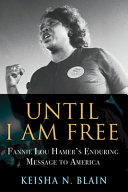2018 School Spending Survey Report
Until I Am Free: Fannie Lou Hamer’s Enduring Message to America
COPY ISBN
VERDICT This excellent introduction to Hamer and her life is well-contextualized; recommended for all readers.
RELATED
ALREADY A SUBSCRIBER? LOG IN
We are currently offering this content for free. Sign up now to activate your personal profile, where you can save articles for future viewing




Comment Policy:
Comment should not be empty !!!